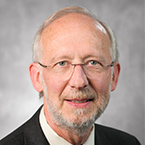
Scientific Areas of Expertise: Centromere Identity; Chromothripsis; Genome Evolution in Cancer
For his celebrated discovery of the revolutionary DNA-based drug treatment ASO (antisense oligonucleotide), and for pioneering research contributions to defining the molecular mechanisms responsible for governing chromosomal movement, cell cycle control, centromere identity, and genome evolution in cancer.
An internationally heralded expert in cancer biology, Dr. Cleveland is celebrated for his discovery of the revolutionary DNA-based drug treatment, antisense oligonucleotide (ASO), and for pioneering research contributions to defining the molecular mechanisms responsible for chromosomal movement, cell cycle control, centromere identity, and genome evolution in cancer.
Dr. Cleveland’s longstanding interests in genomic instability in cancer has led him to unravel the mechanisms by which chromosomes segregate and move, elucidating how errors in chromosome inheritance drive tumorigenesis. He purified and characterized the first microtubule associated protein – tau – which misassembles in affected neurons in Alzheimer’s disease and chronic brain injury. He identified the tubulin gene families encoding the major subunits of microtubules and the first mammalian example of gene expression control through regulated RNA instability. Dr. Cleveland subsequently identified the components required for microtubule nucleation and anchoring during spindle assembly as well as the molecular events required for activation and silencing of the major cell cycle control mechanisms that prevent chromosome segregation errors during cell division. Moreover, Dr. Cleveland discovered CENP-E, a centromere-associated, microtubule-motor protein required for facilitating the alignment of initially misaligned chromosomes. Following this discovery and characterization of CENP-E’s function, several clinical trials have been launched to investigate the use of CENP-E small molecule inhibitors of CENP-E for the treatment of various cancers.
Dr. Cleveland identified principles of genome instability in cancer, demonstrating that single chromosome missegregation can trigger chromosome shattering (chromothripsis) that initiates and drives genome evolution in cancer, including gene amplification through generation extrachromosomal DNAs (ecDNAs). He demonstrated that chromothripsis is a major mechanism for acquired cancer drug resistance. He also identified a previously missing link to cancer mediated by Epstein Barr Virus (EBV), the first virus linked to human cancer and one to which almost the entire human population has been exposed. He showed that EBV encodes a DNA sequence specific binding protein whose binding to palindromic repeats at 11q23 on chromosome 11 triggers its breakage at a fragile DNA site, thereby initiating chromothripsis that can activate the MLL protooncogene and inactivate the ATM tumor suppressor.
Finally, Dr. Cleveland’s pioneering use of DNA ASOs for gene silencing in diseases of the nervous system has led to ongoing clinical trials involving various neurological conditions including ALS, Parkinson’s disease, Huntington’s disease, and Alzheimer’s disease, with FDA approval for an inherited form of ALS and for childhood spinal muscular atrophy. Though initially developed to treat a genetically inherited neurological disorder, ASO-based therapies are now demonstrating promise for the treatment of numerous diseases with a genetic basis, including cancer. More specifically, Dr. Cleveland and his colleagues have extended this designer DNA drug approach to therapy development to glioblastoma, the most aggressive, and currently untreatable type of brain cancer.
Selected Awards and Honors
2018 NOMIS Distinguished Scientist Awardee, Nomis Foundation, Zurich, Switzerland
2018 Breakthrough Prize in Life Sciences, San Francisco, California
2015 Thomson Reuters’ 2015 “The World’s Most Influential Scientific Minds”, Thomson Reuters, Toronto, Canada
2014 Chancellor’s Award for Excellence in Postdoctoral Scholar Mentoring, University of California San Diego, La Jolla, California
2014 The Sheila Essey Prize for ALS Research, The ALS Association, Arlington, Virginia
2014 The Sadie Gerson Distinguished Scholar Award, University of Pittsburgh, Pittsburgh,
Pennsylvania
2013 President, American Society for Cell Biology, Rockville, Maryland
2012 Elected Member, Institute of Medicine, Washington, DC
2012 The Howard Taylor Ricketts Award, University of Chicago, Chicago, Illinois
2012 Katharine Berkan Judd Award, Memorial Sloan Kettering Cancer Center, New York, New York
2012 Research Award, The Huntington’s Disease Society of America, New York, New York
2009 Elected Fellow, American Association for the Advancement of Science, Washington, DC
2007 Wings Over Wall Street Outstanding Scientist Award, Muscular Dystrophy Association, Chicago, Illinois
2006 Elected Fellow, American Academy of Microbiology, American Academy of Microbiology, Washington, DC
2006 Elected Fellow, American Academy of Arts and Sciences, Cambridge, Massachusetts
2006 Elected Member, National Academy of Sciences, Washington, DC
1999 Sheila Essey Prize, American Academy of Neurology, Minneapolis, Minnesota
[Institutional affiliations listed for Fellows reflect those held at the time of their induction into the AACR Academy.]